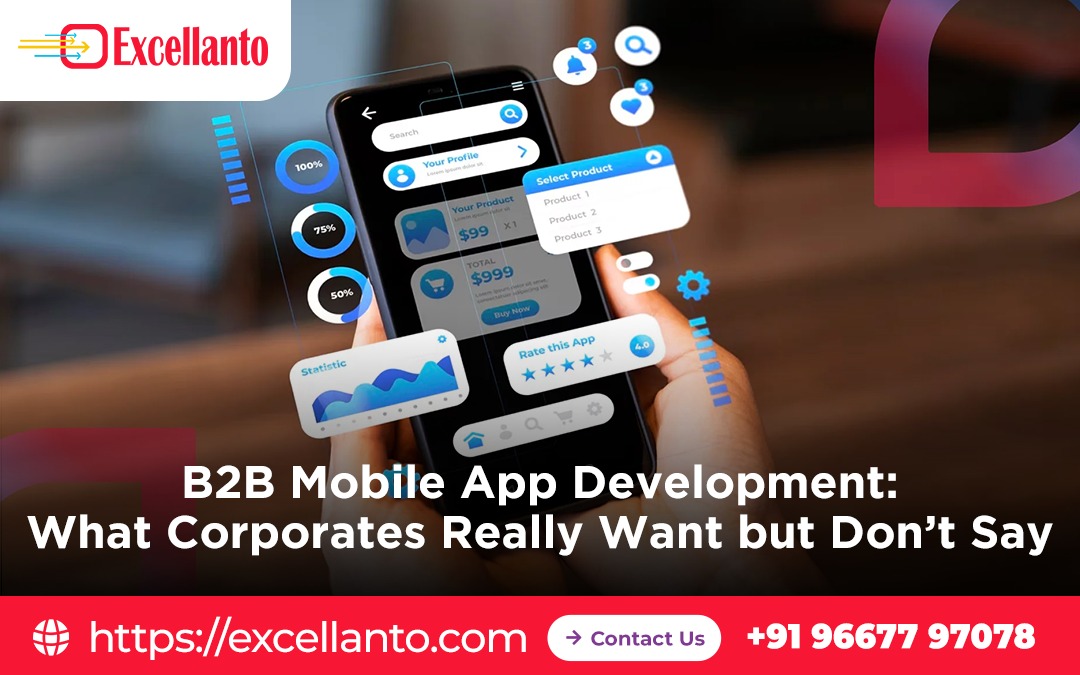In the enterprise world, mobile technology has quietly become the foundation of modern operations. Large companies depend on mobile-powered systems to streamline internal communication, manage workflows, enhance field operations, and offer partners a smoother way to collaborate. But even though business leaders openly discuss features and technical requirements, there is always a deeper layer of expectations they rarely verbalize. These expectations shape the real definition of a successful enterprise application.
Most corporations don’t simply want an app. They want a reliable extension of their business—something that strengthens processes, supports teams, and connects complex systems without creating friction. This is where advanced mobile app development becomes more than just coding; it becomes a strategic exercise in understanding the unspoken needs of enterprise users.
The App Must Become Part of the Business, Not an Additional Task
Corporate teams are often under pressure to meet deadlines, manage teams, and maintain operational continuity. For them, a digital solution must blend into their daily activities, not feel like another system to learn. Even though companies rarely express this directly, they expect an application that reduces manual work, shortens decision cycles, and automates repetitive actions.
An enterprise application should act as an invisible partner—helping employees complete tasks faster, assisting managers with real-time insights, and providing leadership with a reliable view of performance. If a mobile solution increases complexity, senior executives hesitate to adopt it. What they truly want is efficiency delivered through a smooth, intuitive experience.
Integration Is More Important Than Any Feature List
Corporates operate on massive digital ecosystems — ERPs, CRMs, HRMS platforms, inventory systems, financial software, and client portals. When they seek custom mobile applications, they often ask for integration, but they rarely express how serious that expectation is. The truth is that integration is the backbone of their operations.
A business will only trust a mobile app if it communicates flawlessly with existing systems. That means secure data exchange, synchronized updates, and real-time communication across platforms. Enterprises silently expect developers to understand legacy systems, cloud technologies, and API-driven structures without lengthy explanations. Behind every requirement document, there is an unspoken expectation that the mobile application should fit their entire digital architecture, not disrupt it.
Security Is an Unspoken Demand Based on Trust
In the corporate environment, security concerns are massive. Teams discuss compliance, but they rarely reveal the level of dependency they place on their development partner. Large organizations handle sensitive information — customer data, financial reports, product strategies, employee records — and they expect their mobile solution to protect all of it without compromise.
They want the application to follow strict industry regulations, handle secure authentication, encrypt data, manage identities, and maintain access control. More importantly, executives want peace of mind. They want to know that even if a breach attempt occurs, the application is designed to protect the organisation’s reputation. These expectations are rarely spoken aloud, but they influence every decision.
Performance Cannot Fail, Even for a Second
Corporate teams often operate in environments where downtime is not acceptable. Field workers depend on apps for service calls, sales teams depend on them for customer interactions, and managers depend on them for decision-making. A slow or unstable mobile application can interrupt revenue-generating operations, causing losses that no company wants to admit publicly.
This is why responsiveness, stability, and consistency silently become the core of enterprise-grade development. Corporations expect the app to handle large data volumes, support heavy traffic, maintain speed, and perform flawlessly across networks and devices. Even though they don’t always ask directly, the expectation for reliability is deeply embedded into the success of any business application.
Corporate Teams Want Development Partners, Not Order Takers
When enterprises seek a mobile app development company, they might list requirements and deliverables, but behind the scenes they expect something more valuable — strategic thinking. They want a partner who understands business logic, industry demands, and operational challenges.
They want developers who can suggest improvements, identify flaws early, anticipate future needs, and build solutions that evolve with the company. They may not say it, but they want guidance. They want clarity. They want someone who can transform their objectives into a future-ready digital solution that supports long-term growth.
Future-Proofing Is the Hidden Requirement That Decides Everything
Corporations do not want to rebuild their applications every year due to outdated architecture. They silently expect systems that can grow with new business models, support new integrations, and upgrade without complete redevelopment. This includes cloud-readiness, modular coding, AI-friendly structures, and flexible APIs.
When CTOs and CIOs evaluate a mobile app, they examine whether it will support tomorrow’s challenges. They want solutions built on modern frameworks, capable of adapting to new technologies without major disruptions. This is one of the strongest unspoken priorities for enterprise teams.
The Real Value Comes from Insight and Measurable Impact
Corporates might not voice it directly, but they want their mobile solutions to deliver useful insights — not just data. They expect analytics that reveal operational strengths, employee productivity, workflow gaps, and business performance. A powerful enterprise application becomes a source of intelligence that improves decisions, enhances strategy, and supports growth.
This is the difference between a basic app and a transformative system. Leaders expect their mobile platforms to become long-term assets, shaping business efficiency and competitive advantage.
Conclusion
Behind every enterprise requirement lies a deeper expectation that cannot always be expressed in meetings or requirement documents. Corporates want mobility solutions that strengthen their internal systems, protect critical information, reduce manual work, and prepare their business for the future. They look for mobile app development partners who understand business priorities, think ahead, and deliver solutions that support long-term growth.
This silent list of expectations is what truly defines success in the world of B2B mobile applications. When a digital product aligns with these hidden needs, it becomes a powerful driver of organisational transformation.


